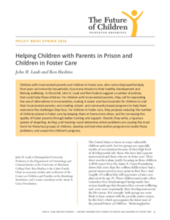Children with incarcerated parents and children in foster care, who come disproportionately from poor and minority households, face many threats to their healthy development and lifelong wellbeing. In this brief, John H. Laub and Ron Haskins suggest a number of policies that could help these children. For children with incarcerated parents, they call for expanding the use of alternatives to incarceration; making it easier and less traumatic for children to visit their incarcerated parents; and creating school- and community-based programs to help them overcome the challenges they face. For children in foster care, they propose reducing the number of children placed in foster care by keeping them at home more often, and for increasing the quality of foster parents through better training and support. Overall, they write, a rigorous system of targeting, testing, and tracking could determine which problems are causing the most harm for these two groups of children, develop and test intervention programs to tackle those problems, and assess the children’s progress.

